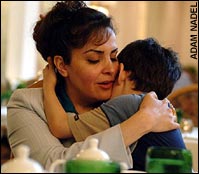 Via East of Kurdistan
Via East of Kurdistantelegraph.co.uk
By Philip Sherwell in Washington
A leading Iranian pro-democracy and women's activist, who was jailed on trumped-up charges last year, has revealed how the clerical regime cynically deploys systemic sexual violence against female dissidents in the name of Islam.
Roya Tolouee, 40, was beaten up by Iranian intelligence agents and subjected to a horrific sexual assault when she refused to sign forced confessions. It was only when they threatened to burn her two children to death in front of her that she agreed to put her name to the documents.
Perhaps just as shocking as the physical abuse were the chilling words of the man who led the attack. "When I asked how he could do this to me, he said that he believed in only two things - Islam and the rule of the clerics," Miss Tolouee told The Sunday Telegraph last week in an interview in Washington after she fled Iran.
"But I know of no religious morality that can justify what they did to me, or other women. For these people, religion is only a tool for dictatorship and abuse. It is a regime of prejudice against women, against other regimes, against other ethnic groups, against anybody who thinks differently from them."
Miss Tolouee's account of her ordeal confirms recent reports from opposition groups that Iranian intelligence officials use sexual abuse against female prisoners as an interrogation technique and even rape young women before execution so that they cannot reach heaven as virgins.
Few women from the Islamic world are willing to discuss such matters, even with each other, but Miss Tolouee said that the regime routinely committed sexual attacks against female detainees.
She dropped her voice to a whisper and sobbed quietly as she described her experience, hoping not to upset her six-year-old son, Nima, as he picked at a piece of pizza in a hotel restaurant.
But he tried to comfort her. "I don't like it when my mummy talks about prison. It makes her cry," he said sadly. Miss Tolouee, who founded a women's group in Iranian Kurdistan and then launched a monthly magazine that was closed down by the judiciary last summer, was detained in the city of Sanandaj in August after taking part in anti-regime demonstrations that spread across Kurdish areas.
"Four armed men and three armed women barged into my house at night and took me away," she said. "My kids were terrified and crying. I was questioned all night by different interrogators and then thrown alone into a cell."
She was held in solitary confinement in the prison of the feared internal intelligence service, with only a blanket and a cup that often had to serve as a lavatory. For the first six nights, she was taken to a basement where interrogators demanded that she admit to organising the protests, and also that she identify co-conspirators on a list of names they put to her.
"When I wouldn't do what they wanted, they slapped me. But after the sixth night, the routine changed. I was left alone in a small dark room with two men. One was the assistant prosecutor and called himself Amiri. The other had a filthy mouth and said terrible things. They started slapping me again. For the rest of the night they did to me what no woman should ever experience. Amiri said, 'I'm going to hang you, but before I hang you, I will make an example of you so that no woman will dare to open her mouth here again'." He then sexually assaulted her.
When she asked Amiri how he could act like that, he told her that only Islam and clerical rule were important to him. The attack left her badly bruised and bleeding internally, but she refused to sign the papers they put before her. To her assailants' fury, she demanded to see a lawyer and cited international treaties on human rights.
The following night they did not sexually molest her again as she was still bleeding - and hence "unclean". Instead, they told her that they would kill her children by setting them on fire before her eyes.
Finally, she admits, she cracked. "I threw myself at Amiri's feet and begged him not to harm my children. I said I'd do anything they wanted. Whatever they wanted, I would sign." She admitted to conspiring against the regime by giving interviews to the foreign media and leading the protests, but said that she did not implicate others.After several more nights in solitary confinement, Miss Tolouee was moved to a general women's prison, where she saw horrendous festering wounds inflicted by lashings on other detainees.
Trying to maintain her dignity and strength, she taught the women about their basic human rights and helped to secure the provision of sanitary supplies for the first time. "We had a great feeling of camaraderie," she recalled.
Miss Tolouee was released on bail after 66 days in jail because, she said, "The regime had got what it wanted". But she still feared for her children's lives and decided to flee. She made it first to neighbouring Turkey with Nima and then her daughter Shima, 14, was smuggled out to join them.
Fearful of the reach of regime agents, who have killed exiled dissidents, an opposition group called the Alliance of Iranian Women helped them to reach the United States last month.
Miss Tolouee has been granted political asylum and intends to maintain her campaign against Teheran. She still has relatives in Iran - she does not want to go into details for reasons of security - but says that they have given her their blessing to speak out, despite the possible consequences.
The world's attention is currently focused on Iran's nuclear ambitions under its hardline president, Mahmoud Ahmadinejad, who came to office while Miss Tolouee was in prison. But inside Iran, she says, little has changed.
"Sometimes the regime seems a bit better, sometimes a bit worse, but for the people of Iran, the suffering continues," she said.





